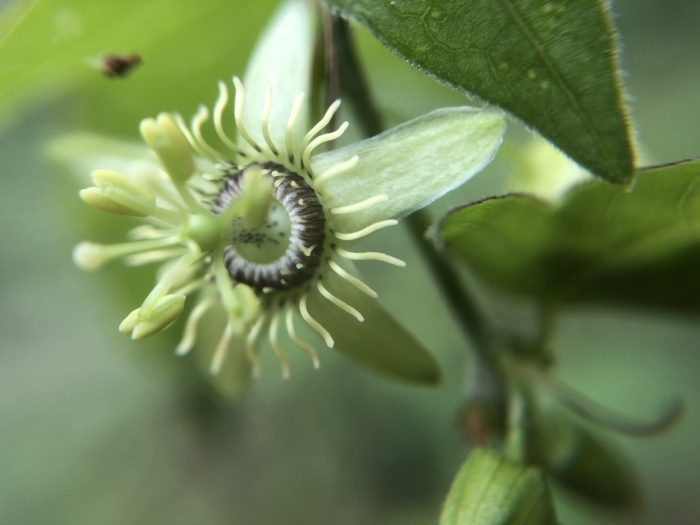Corkystem Passionflower
(Passiflora suberosa)
Corkystem Passionflower (Passiflora suberosa)
/
/

黃美滿
CC BY 4.0
Image By:
黃美滿
Recorded By:
Copyright:
CC BY 4.0
Copyright Notice:
Photo by: 黃美滿 | License Type: CC BY 4.0 | License URL: http://creativecommons.org/licenses/by/4.0/ | Rights Holder: 黃美滿 | Publisher: iNaturalist | Date Created: 2020-02-17T05:15:31Z |

























Estimated Native Range
Summary
Passiflora suberosa, commonly known as corkystem passionflower, is a perennial climbing vine native to a variety of habitats including tropical and subtropical woodlands, thickets, and disturbed areas throughout the Americas. It can reach lengths of up to 20 feet, with distinctive corky stems that give the plant its common name. The leaves are variable in shape, often lobed, and the plant may be semi-evergreen depending on the climate. The small, greenish or yellowish flowers, which lack true petals, are not particularly showy but are rich in nectar and bloom from late summer to late winter, attracting pollinators such as bees. Following flowering, the vine produces inedible fruits that transition from green to black as they mature and are primarily dispersed by birds.
Corkystem passionflower is valued for its rapid growth and adaptability, making it suitable for covering trellises, fences, and other structures in warm climates. It thrives in full sun to part shade and prefers well-drained soils but can tolerate a range of soil conditions. While it requires moderate watering, once established, it is quite drought-tolerant. Gardeners should be cautious, as it can become invasive outside its native range, and it is advisable to check local regulations before planting. This species is also used in butterfly gardens to attract and serve as a host plant for various butterfly species, including the Gulf Fritillary. Potential problems include susceptibility to pests such as aphids and caterpillars, which can be managed with regular monitoring and appropriate control measures.CC BY-SA 4.0
Corkystem passionflower is valued for its rapid growth and adaptability, making it suitable for covering trellises, fences, and other structures in warm climates. It thrives in full sun to part shade and prefers well-drained soils but can tolerate a range of soil conditions. While it requires moderate watering, once established, it is quite drought-tolerant. Gardeners should be cautious, as it can become invasive outside its native range, and it is advisable to check local regulations before planting. This species is also used in butterfly gardens to attract and serve as a host plant for various butterfly species, including the Gulf Fritillary. Potential problems include susceptibility to pests such as aphids and caterpillars, which can be managed with regular monitoring and appropriate control measures.CC BY-SA 4.0
Plant Description
- Plant Type: Vine
- Height: 4-30 feet
- Width: 2-30 feet
- Growth Rate: Moderate, Slow
- Flower Color: Cream, Green
- Flowering Season: Spring, Summer, Fall
- Leaf Retention: Evergreen
Growth Requirements
- Sun: Full Sun, Part Shade
- Water: Medium
- Drainage: Fast, Medium
Common Uses
Bird Garden, Butterfly Garden, Low Maintenance
Natural Habitat
Native to a variety of habitats including tropical and subtropical woodlands, thickets, and disturbed areas throughout the Americas
Other Names
Common Names: Indigo Berry , Cork Passionflower , Cork Passionvine , Corky Passionflower , Devil’s Pumpkin , Wild Passionfruit , Grain D’Encre , Grenadille
Scientific Names: Passiflora suberosa , Passiflora hederifolia var. beta , Passiflora hederifolia var. gamma , Passiflora maculata
GBIF Accepted Name: